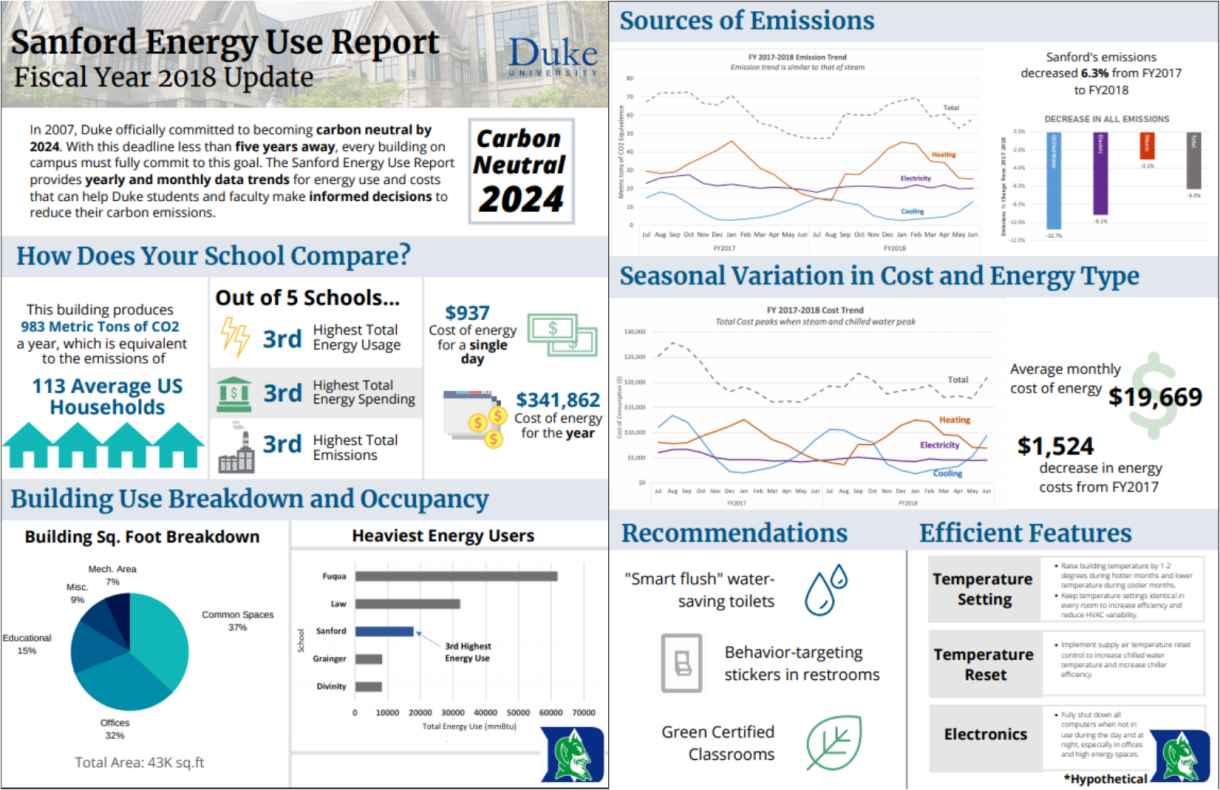
Duke University Building Energy Reporting
Timeline
Fall 2019 - Spring 2020
Description
The Bass Connections team aimed to find a way for Duke University to more effectively report the energy usage of Duke's buildings to different stakeholders. It is crucial to understand the energy consumption patterns of buildings since buildings and their related constructions consume ~36% of global final energy consumption and are responsible for nearly 40% of total carbon emissions.
Duke has improved the efficiency of its buildings on campus by 19% since 2007. However, there are still opportunities to reduce building energy use by educating key stakeholders in buildings. Building energy reports educate decision-makers on building energy use and performance, including visualized consumption, cost, and emissions data. Therefore, in order to help Duke achieve carbon-neutrality by 2024, tracking the energy usage of buildings is central to reducing emissions.
Using the an energy use dataset developed by a 2019 Data+ team, the Bass Connections team created energy reports for 8 different buildings across campus in the fall. The team consolidated the most effective aspects of these 8 reports to create a final report template. Afterwards, the team interviewed key stakeholders in campus finance and operations and used their feedback to further refine the report. Over the course of the project, the team discovered that while building managers and other stakeholders had access to energy usage data, they felt that they did not have a centralized and visual way to view this data. The line graphs, bar charts, pie charts, and other visualizations in the reports gave stakeholders a more succinct and effective way to view the data.

During the spring semester, the team pivoted towards student engagement, which involved creating an energy use report specific to dorms. This report, which includes energy consumption trends, emissions, cost, energy use rankings, and recommendations for improvement will be provided to the Assistant VP of Student Affairs and Dean for Residential Life, Joe Gonzalez. Finally, the team spent the end of the spring semester editing final versions of the building energy use reports, streamlining the process for generating data visualizations, creating an instructional guide for making future versions of the energy reports, and providing a comprehensive transition plan for Sustainable Duke to continue the project.
Location: Sanford School of Public Policy, Law School, Fuqua School of Business, Grainger Hall, Westbrook Building, Gross Hall
Team
Members
Yuchen Zhu, Hazel Horvath, Joyce Huang, Sara Platek, Thomas Wang, Carsten Pran, Ziwei Zhu, Mingjie Zhao
Leaders
Jason Elliott, Billy Pizer, Zach Johnson
Sponsors
Sustainable Duke, Facilities Management Department, Sanford School of Public Policy, Student Affairs
Related Content
Related Links
Related Courses
Bass Connections
Academic Projects